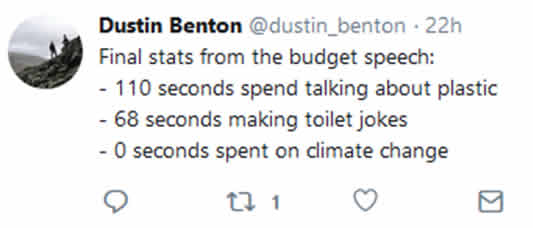The 2018 budget has made headlines, but how does it support a sustainable future? While impending Brexit retains the dominant position in public and political debate, the Autumn budget is important as it indicates the government’s priorities and how it plans to fund its objectives.

Like 2017 we’ve tried to cut through all the noise and rhetoric and concentrate on what looks to be most important for the environment and sustainability.
Last year we focused on Air quality, Housing & social support, Climate and Plastics. The parliamentary agenda, being dominated by Brexit, has meant little progress in many of these areas.
The headline message was the end of austerity (if you’re not in the UK – we bailed out the banks in 2008 and have been paying for it ever since). While commentators have questioned if this is really the end of cuts, the chancellor has certainly taken the opportunity afforded by slightly better growth figures to spend more than we have seen for several years.
Air quality & transport
Air quality, in the UK and globally, has been dubbed a public health emergency but the government continues to drag its feet on taking any decisive action. In a year in which the UK government was referred to Europe’s highest court, the European Court of Justice for its to failure to meet EU limits for nitrogen dioxide (NO₂) it might have been hoped that the budget would herald further investment in improving and maintaining air quality, however this was not the case.
In contrast, the previously planned rise in on fuel duty (petrol and diesel) was scrapped again – for the ninth year consecutively.
Before the budget, the government cut back on subsidies for electric cars and focused remaining funds more upon charging infrastructure. This remains a logical step but apparently entirely lacking in ambition.
The budget included £30bn provision for roads maintenance, potholes have been multiplying and this will be welcomed by road users of all types. However, critics have pointed out the funds can also include new road building and dwarf those set aside for tree planting – £60m.
Housing & social support
The Universal Credit system has been controversial on many fronts and has been subject to severe cuts in recent years. The Chancellor replaced a large chunk of funding with a £1.7bn cash injection which should at least partly soften the blow of transition. However, the tax cuts handed out appear on balance to disproportionately favour higher earners.
There was an announcement of an extra £500m for the Housing Infrastructure Fund which should enable a further 650,000 homes to be built. The National Living Wage was increased by 4.9%.
Plastics
In last year’s budget it emerged that the chancellor had been watching Blue Planet II, he said “I want us now to become a world leader in tackling the scourge of plastic littering our planet and our oceans”. There was a call for evidence as to how the tax system might help achieve this objective. This year’s budget failed to bring a charge on single use coffee cups like many groups such as Greenpeace – and the MPs Environmental Audit Committee – were calling for. However, a new tax is being consulted (which would come online in 2022) which would apply to food and drink packaging that did not include at least 30% recycled content. Various funds totaling up to £50m (the timescales are unclear) were announced to tackle litter, plastics research and recycling.
Climate – Isn’t there an elephant in this room?
Last year’s budget saw some modest additions to electric vehicle funding. Recent announcements have heralded a reduction in subsidies available for electric car purchase.
This year, climate was conspicuous by its absence. In the light of the recent IPCC report which highlights the need for increased urgency to avoid a 2c rise in global temperatures over the next 12 years, you may have imagined that the UK government (which has legally committed to a carbon reduction pathway to reduce carbon emissions by at least 80%, relative to 1990s levels) might have considered that climate change should feature, at least in some ways, in its financial and economic planning. This was not the case.
Indeed, with the resumption of gas fracking in the North West, and a continuing of last year’s commitment to expanding oil and gas extraction in the UK, you have to wonder what the Government’s commitment to decarbonisation is.
Perhaps the best summary of the environmental credentials of the budget came from Green Alliance policy director Dustin Benton:
What does this mean?
The emphasis on plastics and broad approach to different parts of the problem is to be welcomed, but the scale of effort is tiny. It has been estimated that c. 2.5 billion disposable coffee cups are used each year in the UK. Translated into a 25p per cup tax this would perhaps equate to tax revenue of over £600m – the Chancellor’s investments in the issue are less than 10% of this.
In addition, the total lack of new policies on decarbonisation, solar power investments and a seemingly joined up approach to a renewable energy transition seem to mean that, yet again, a sustainable future is simply not a priority.
Are you looking to develop or exceed ambitious sustainability goals? Talk to our sustainability consultants for an exploratory chat without obligation.
Talk to our sustainability consultants


Leave a Reply